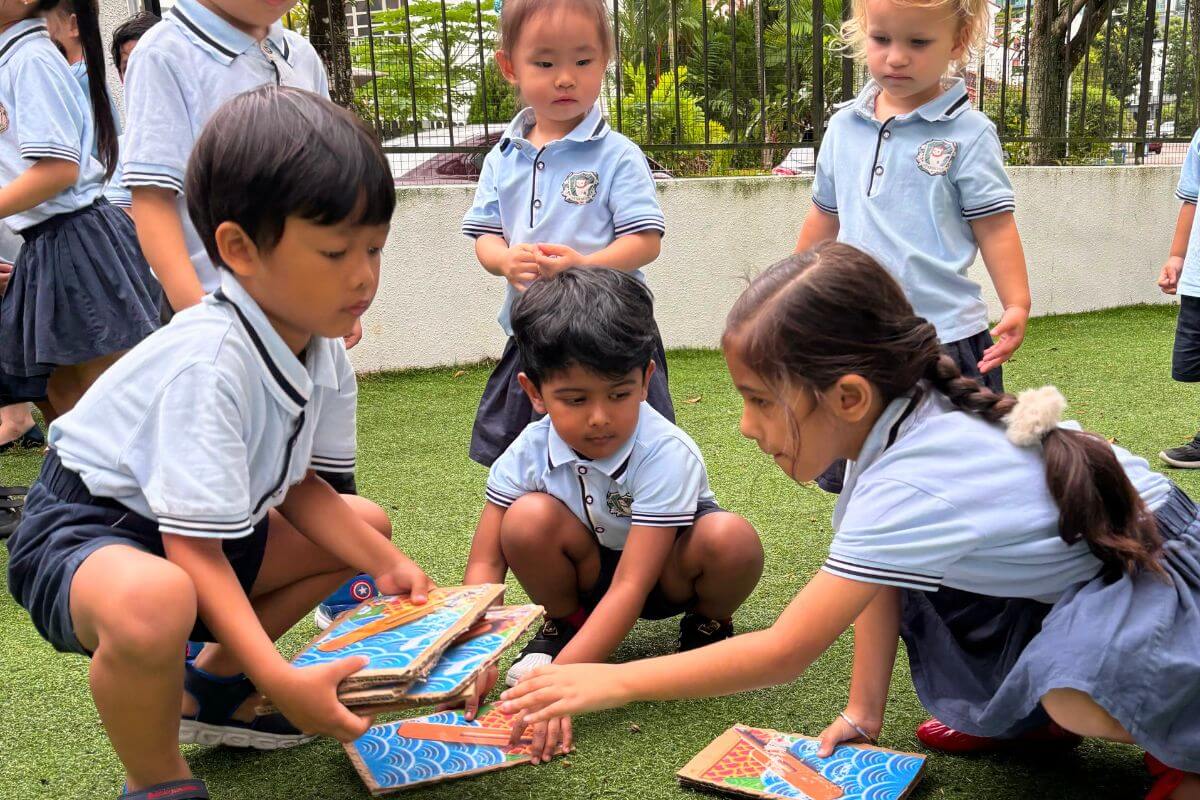Introduction to Montessori Education
Montessori education, pioneered by Dr. Maria Montessori, emphasises child-centered learning that nurtures independence, creativity, and self-discipline. It’s a unique approach to early childhood education designed to foster not only academic success but also holistic development, including social and emotional growth.
Social and emotional development is crucial in the early years, as it equips children with the ability to interact positively with others, manage emotions, and develop empathy. These skills set the foundation for success in both academic and personal aspects of life. Montessori education is distinct in how it promotes these skills by encouraging self-regulation, collaboration, and emotional awareness.
At Starshine Montessori Preschool, we recognize the importance of these elements and are committed to integrating them into our programs. Montessori principles, such as a prepared environment and mixed-age classrooms, create an atmosphere where children thrive socially and emotionally, learning at their own pace while developing essential interpersonal skills.
The Core Principles of Montessori That Support Development
Montessori’s principles of child-centered learning provide an ideal framework for promoting social and emotional growth. The focus is on the child’s natural development, allowing them to explore, make choices, and learn from their surroundings.
- Child-Centered Learning: Each child is seen as an individual with unique strengths and challenges. The Montessori approach provides personalized learning paths that promote autonomy. Children learn to make decisions and take responsibility for their actions, both critical for emotional development.
- Role of Independence and Freedom with Limits: Montessori encourages independence while providing structure through freedom within limits. This balance helps children learn self-regulation, an essential skill for managing emotions. Freedom of choice allows them to pursue activities that resonate with them, helping them feel more in control, thus boosting self-esteem and emotional security.
For parents who are new to Montessori, understanding how this method shapes their child’s development is vital. We offer resources such as a Beginner’s Guide for Parents to help you navigate this educational journey.
How Montessori Encourages Social Development
Social skills in a Montessori setting are cultivated through interaction, collaboration, and community engagement. One of the hallmarks of the Montessori method is the emphasis on collaborative learning.
- Collaborative Learning Environment: Montessori classrooms are designed to encourage group work and peer-to-peer interaction. Children often work in small groups, learning to cooperate, share ideas, and solve problems together. This naturally promotes social development by helping children communicate effectively and understand others’ perspectives.
- Mixed-Age Classrooms and Peer Learning: In Montessori, children of different ages learn together, which mimics a family-like environment. Older children take on leadership roles, mentoring the younger ones. This multi-age setup teaches empathy, patience, and social responsibility. It also enhances learning by allowing children to teach and learn from one another, fostering a sense of community and belonging.
- Conflict Resolution and Communication Skills: Montessori educators teach children peaceful conflict resolution techniques. Through guided conversations, children learn to express their emotions and listen to others, developing empathy and problem-solving skills. Encouraging healthy communication in early years is key to fostering positive relationships.
At Starshine Montessori, we extend these concepts into other learning areas. For instance, play is integral to cognitive development, offering children additional opportunities to engage with peers in a relaxed and creative environment.
Montessori and Emotional Development
Montessori education nurtures emotional intelligence by fostering self-awareness and emotional regulation. Children are given tools and opportunities to understand their emotions and express them in healthy ways.
- Fostering Emotional Intelligence: Emotional intelligence refers to the ability to recognise, understand, and manage one’s emotions and those of others. Montessori activities are designed to encourage reflection and emotional awareness. Children are taught to label their emotions, which enhances their emotional vocabulary and understanding. This leads to better self-regulation and empathy for others.
- The Role of Self-Regulation and Autonomy: Self-regulation is a critical aspect of emotional development. Montessori emphasises the importance of autonomy by giving children the freedom to choose their activities and work at their own pace. This self-directed learning fosters a sense of accomplishment, helping children manage frustration and stress, essential components of emotional resilience.
- Teacher’s Role as an Emotional Guide: In Montessori classrooms, teachers observe more than they instruct. Their role is to guide children gently through their emotional experiences, offering support when needed. This nurturing environment allows children to feel safe and secure, enabling them to express their feelings without fear of judgment.
In addition to emotional guidance within the classroom, maintaining positive teacher-child relationships further reinforces emotional stability and growth, creating an atmosphere of trust and understanding.
The Prepared Environment: Supporting Emotional and Social Growth
The Montessori environment, often referred to as the “prepared environment,” is carefully designed to support children’s physical, emotional, and social development.
- Structuring a Classroom to Encourage Social Interaction: Montessori classrooms are open and inviting, with materials displayed at child-height to encourage exploration. The arrangement of tables and workspaces promotes social interaction, allowing children to naturally engage with their peers.
- Materials and Activities that Promote Emotional Resilience: Montessori materials are not only educational but also emotionally enriching. Practical life activities such as pouring, sweeping, and dressing allow children to engage in purposeful work. These tasks give them a sense of responsibility and accomplishment, contributing to emotional resilience.
Additionally, the integration of outdoor learning, as discussed in our article on the benefits of outdoor learning in early childhood, complements the emotional growth fostered inside the classroom.
Practical Life Activities and Their Role in Development
One of the defining features of Montessori education is the emphasis on practical life activities. These everyday tasks, such as preparing snacks or cleaning up after themselves, help children develop a wide range of skills that contribute to both social and emotional growth.
- Encouraging Responsibility and Empathy: Practical life activities encourage responsibility and instill a sense of empathy. For example, when a child prepares a snack for a classmate or helps clean up after an activity, they are learning to care for others and their environment. This promotes a sense of community and teaches them the value of teamwork and shared responsibilities.
- Building Self-Esteem Through Daily Tasks: As children master these tasks, they gain a sense of independence and confidence. Successfully completing a task, no matter how simple, boosts self-esteem. These small achievements accumulate, helping children feel capable and empowered, which is essential for healthy emotional development.
For parents interested in extending this learning at home, engaging children in simple, purposeful activities—like those found in our creative learning tips—can further nurture these skills.
The Importance of Freedom and Limits in Emotional Regulation
Montessori’s approach to balancing freedom with structure plays a significant role in helping children develop emotional regulation. By giving children the freedom to choose their activities within defined limits, Montessori fosters an environment where children can practice self-discipline.
- How Montessori Balances Freedom with Structure: Children in a Montessori setting are given choices, but those choices come with boundaries. This balance teaches children how to manage their impulses and make thoughtful decisions. Over time, they learn how to handle frustration, delay gratification, and practice patience—skills that are vital for emotional maturity.
- Developing Self-Discipline and Patience: Self-discipline is essential for emotional regulation, and Montessori’s method encourages its development. By allowing children to choose their activities and work independently, they learn to stay focused, manage time, and complete tasks, all of which contribute to emotional control and resilience.
For more on how the Montessori method equips children for real-world success, visit our article here.
Peer-to-Peer Interaction and Its Impact on Social Skills
Peer interactions in Montessori classrooms play a significant role in the development of social skills. The emphasis on cooperation over competition ensures that children learn how to work well with others.
- Importance of Collaboration over Competition: Montessori values collaboration, not competition. Children are encouraged to work together to solve problems, share ideas, and support each other in their learning. This collaborative environment fosters kindness, respect, and the ability to see things from others’ perspectives.
- Developing Leadership and Cooperation Skills: In mixed-age classrooms, older children often take on leadership roles by helping younger ones. This dynamic not only builds confidence and leadership skills in the older children but also nurtures a cooperative spirit. Younger children, in turn, learn from their peers, creating a supportive, inclusive learning environment.
Long-Term Benefits of Montessori on Social and Emotional Well-Being
The long-term benefits of Montessori education on social and emotional well-being are well-documented. Children who have experienced Montessori education are often better equipped with the emotional and social tools needed to succeed in life.
- Studies Supporting Montessori’s Role in Emotional Development: Research shows that children from Montessori backgrounds tend to have better emotional regulation, social skills, and academic outcomes compared to those from traditional educational systems.
- Lifelong Skills Gained Through Montessori: Montessori education equips children with lifelong skills such as problem-solving, empathy, and emotional intelligence, which are invaluable in personal relationships, academic pursuits, and career success.
Why Montessori is Key to Developing Well-Rounded Individuals
Montessori education is a powerful method for fostering social and emotional development in children. By emphasising independence, collaboration, and emotional awareness, Montessori creates an environment where children can thrive both academically and personally. At Starshine Montessori Preschool, we are committed to helping children grow into well-rounded individuals who are confident, empathetic, and emotionally resilient.
For more insights into how Montessori can benefit your child, explore our articles on raising confident children and Montessori education’s encouragement of creativity and critical thinking.
Follow us on social media to stay updated on our latest updates and happenings:







Comments are closed